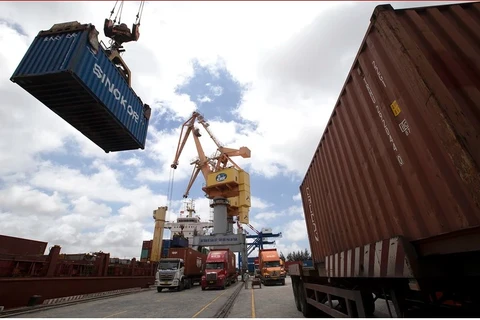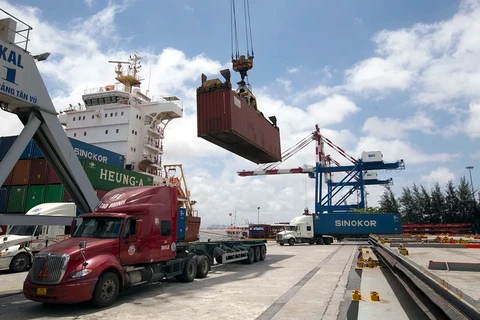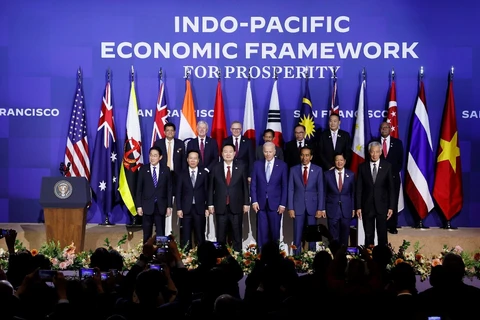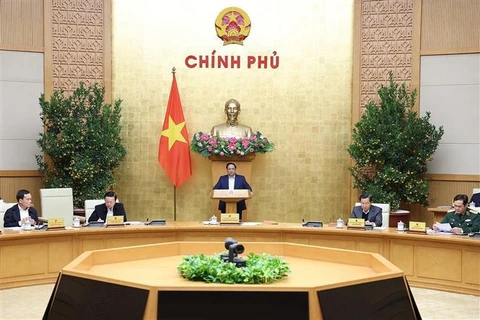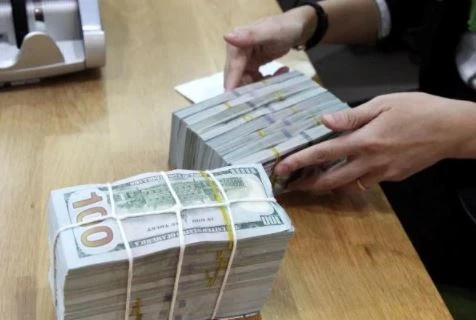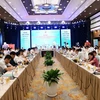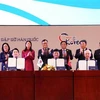 The domestic market continues to be the "backbone" of the economy amidst export difficulties. (Photo: VietnamPlus)
The domestic market continues to be the "backbone" of the economy amidst export difficulties. (Photo: VietnamPlus) Hanoi (VNA) - With comprehensive solutions, the Ministry of Industry and Trade (MoIT) has joined concerted efforts to help the domestic economy overcome unprecedented challenges it faced last year.
At the outset of the Year of the Dragon, Minister of Industry and Trade Nguyen Hong Dien engaged in discussions with reporters regarding the outcomes of the sector in 2023 and specific tasks for it to undertake this year.
Reporter: The year 2023 could be described as a year of unprecedented challenges for the global economy and for Vietnam. How did these difficulties affect the industry and trade sector, and how did the Ministry of Industry and Trade respond to them?
Minister Nguyen Hong Dien: In 2023, the global situation continued to evolve rapidly, and unpredictably, with the global economic recovery taking place slower than anticipated. Many countries, including our major trading partners, experienced reduced growth. Although inflation cooled down, it remained high, resulting in many economic powerhouses with tightened monetary policy, reduced aggregate demand, and direct impact on countries with a high level of economic openness like Vietnam.
Domestically, the economy, particularly the industrial sector, gradually regained growth momentum and adapted more effectively to the new global situation. However, challenges persist, especially the "dual impact" from external disadvantages and longstanding internal constraints.
For the industry-trade sector, direct impacts of these challenges included significant declines in export and industrial production during the early months of the year, limited connectivity among enterprises within and across industries, domestic trade growth falling short of pre-COVID-19 levels.
Furthermore, its monitoring, evaluation, and implementation of commitments to integration recorded proactive initiatives and innovative execution methods. However, there were still shortcomings, particularly in the integration capacity of domestic enterprises, especially small- and medium-sized ones.
Adhering closely to resolutions and conclusions of the Party Central Committee and the National Assembly, as well as the guidance and direction of the Government and the Prime Minister, the MoIT promptly identified the challenges. They then implemented comprehensive solutions, hence positive results significantly contributing to the country's economic growth.
Accordingly, domestic trade maintained relatively high growth, exceeding set targets and serving as the backbone of the economy amidst difficulties facing industrial production and exports. E-commerce continued its strong development, maintaining its position among the world's leading countries in terms of growth rate, becoming a crucial distribution channel, contributing to the development of supply chains and goods circulation, and driving economic development.
Industrial production and import-export activities saw positive recovery in the final months of the year. Notably, the trade surplus hit a record high for the 8th consecutive year, helping the economy enhance foreign exchange reserves and stabilise exchange rates and macroeconomic indicators. The ministry efficiently completed many other tasks, meeting the set objectives and plans and providing favourable conditions and a foundation for the sector to overcome difficulties and grow amidst an extremely challenging market.
Reporter: Import-export activities in 2023, while not achieving high figures as in 2022, were still considered by experts a remarkable achievement of a record high trade surplus. Could you elaborate more on this?
Minister Nguyen Hong Dien: As we were aware, the political and economic situation globally witnessed unpredictable changes last year. Global trade declined, growing only by 0.8%, halving the WTO's forecast of 1.7%, due to increasing pressure from the increasingly complex geopolitical and geo-economic tensions worldwide.
Additionally, global input material, energy, and logistics prices surged, impacting business production costs. Although inflation in many countries decreased, it remained at high levels, leading to reductions in spending and purchasing across major consumer markets such as the US and the EU, hence their lower demand for imports. China's reopening also created significant competitive pressures on Vietnam's exports.
Furthermore, protectionist policies and price competition among exporting countries with the same product increased. Countries erected more technical barriers, creating new pressures on our exports and significantly affecting domestic industrial production and trade activities.
These challenges did not only arise in 2023 but were latent since the last months of 2022. However, the ministry accurately forecasted these global economic challenges from the outset of 2023 to advise the Government to timely plan proactive, flexible response scenarios.
At a conference on promoting domestic production and expanding export markets in 2023, one of PM Pham Minh Chinh's key directives was for the ministry to fully embrace the spirit of "finding opportunities in challenges" to promote and expand export markets.
Grasping directives of the Government and the PM, the ministry’s market development works were extensive. For example, in addition to the organisation of trade fairs and business networking activities at home and in key foreign markets like China, Thailand, and Europe, trade promotion efforts saw innovative features that aligned with major policies.
The ministry’s 12 monthly trade promotion sessions covered various themes and spanned across multiple sectors, industries, and markets. Some provided directions for enterprises and associations regarding specific export market requirements, while others directly addressed immediate difficulties, such as those involving the Chinese market. The ministry also regularly updated export activity developments at border gates to propose timely recommendations to address hindrances to the smooth flow of goods.
Thanks to timely and proactive measures, which seized opportunities from the recovery of major traditional markets, our export activities were sustained and enhanced. The total trade turnover for the year was estimated at 683 billion USD, with exports alone reaching 355.5 billion USD.
To be frank, this growth figure had yet to meet expectations and targets set for 2023. However, given continued slow global economic growth and declining global demand, Vietnam's export activities managed to overcome significant difficulties, narrowing its decline towards the end of the year. This demonstrated the ministry's efforts in export management.
In my view, one of the notable highlights in this year's import-export landscape is the consecutive trade surplus for the 8th year, reaching an estimated 28 billion USD. This nearly tripled that of 2022, positively contributing to payment balance, enhancing foreign exchange reserves, and stabilising exchange rates, and other macroeconomic indicators.
This figure needs to be viewed positively when compared to the global context. Specifically, in Vietnam, at the end of the first quarter, exports recorded an 11.8% decrease compared to the same period last year. From the end of the second quarter, exports showed signs of recovery with consecutive month-on-month increases.
At the end of the third quarter, the export decline narrowed to 8.5% annually. At the end of the year, the export value was estimated at 355 billion USD, with the decline narrowing to 4.4% compared to 2022. Compared to such declines of other countries in the region, Vietnam's exports showed a more positive recovery.
Reporter: Despite facing numerous challenges over the past year, the industrial sector remains a cornerstone of the economy. Could you please shed light on its bright spots last year?
Minister Nguyen Hong Dien: In 2023, despite encountering significant challenges, industrial production still maintained growth momentum compared to the previous year, with the production scale continuing to expand.
The processing and manufacturing industry was a bright sport. This sector is pivotal to the overall industrial growth rate, generating the highest value-added for the sector and serving as the main driving force for the country's economic growth in recent years.
Specifically, the sector’s growth in the final months of 2023 contributed to the overall growth of the industrial production index (IIP) compared to the same period last year. The industrial value-added for the entire year was estimated to increase by 2.98%; of which, with processing-manufacturing growing by about 3.48%.
 Vietnam, for the 8th year in a row, posted a trade surplus of 28 billion USD in 2023, nearly tripling that of 2022. (Photo: VietnamPlus)
Vietnam, for the 8th year in a row, posted a trade surplus of 28 billion USD in 2023, nearly tripling that of 2022. (Photo: VietnamPlus) Another notable bright spot was the collaboration between the ministry, the Ministry of Planning and Investment, and many localities nationwide. We implemented various measures to connect FDI enterprises and domestic businesses in developing the processing-manufacturing and supporting industries. Not only focusing on large corporations, the ministry also paid attention to micros and small enterprises to help them keep up with the trends of the Fourth Industrial Revolution.
These achievements demonstrated the correctness of the Party’s and Government’s directions, goals, and leadership in comprehensively promoting the industrialisation process, and developing fundamental industrial sectors, while not neglecting small- and medium-sized enterprises.
Reporter: Could you reveal the ministry’s forecasts regarding challenges facing 2024 and measures developed to cope with them?
Minister Nguyen Hong Dien: 2024 is a pivotal year determining the outcomes of the five-year Plan (2021-2025) amidst projections of ongoing difficulties and challenges. Our economy is significantly open and heavily reliant on global trends, while the international landscape continues to evolve in complex and unpredictable ways. Though the global economy shows signs of recovery, it remains sluggish with underlying uncertainties and risks.
In response to this landscape, to fulfill and surpass the targets set for the industry and trade sector, the ministry will prioritize innovation and enhance the quality of institutional work.
In the immediate term, it will focus on completing the national energy and mineral planning, and give advice on drafting, amending, and supplementing laws, decrees, and policies crucial to the production and business activities of enterprises. These include the law on priority industrial development, the chemical law (amended), and the electricity law (amended), among others. It is also necessary to propose innovative mechanisms and policies to drive the development of emerging sectors, industries, and business models, fostering efficiency and creating new momentum for the nation's economic growth.
The ministry emphasised tasks and solutions to address bottlenecks and support enterprises in recovery and production development, especially in the processing and manufacturing industry. It will accelerate the implementation of industrial, energy and trade development projects, particularly key ones, to promptly put them into operation, contributing to enhancing the internal capacity of the economy.
The sector will focus on developing vital support industries as well as new and advanced technologies, while proactively advising on leveraging opportunities from foreign relations with major countries to anticipate the shift in investment focus of multinational corporations to third countries, especially in sectors that Vietnam has demand and advantages. It will also effectively utilise the role of foreign trade offices in supporting localities and enterprises to exploit the benefits of free trade agreements of which Vietnam is a member, to diversify markets and supply chains, and to boost exports.
The ministry is also set to refresh trade promotion activities, streamline its apparatus to ensure lean and efficient operations. It will push ahead with administrative reform, digital transformation, and innovation in working methods.
Thank you!

